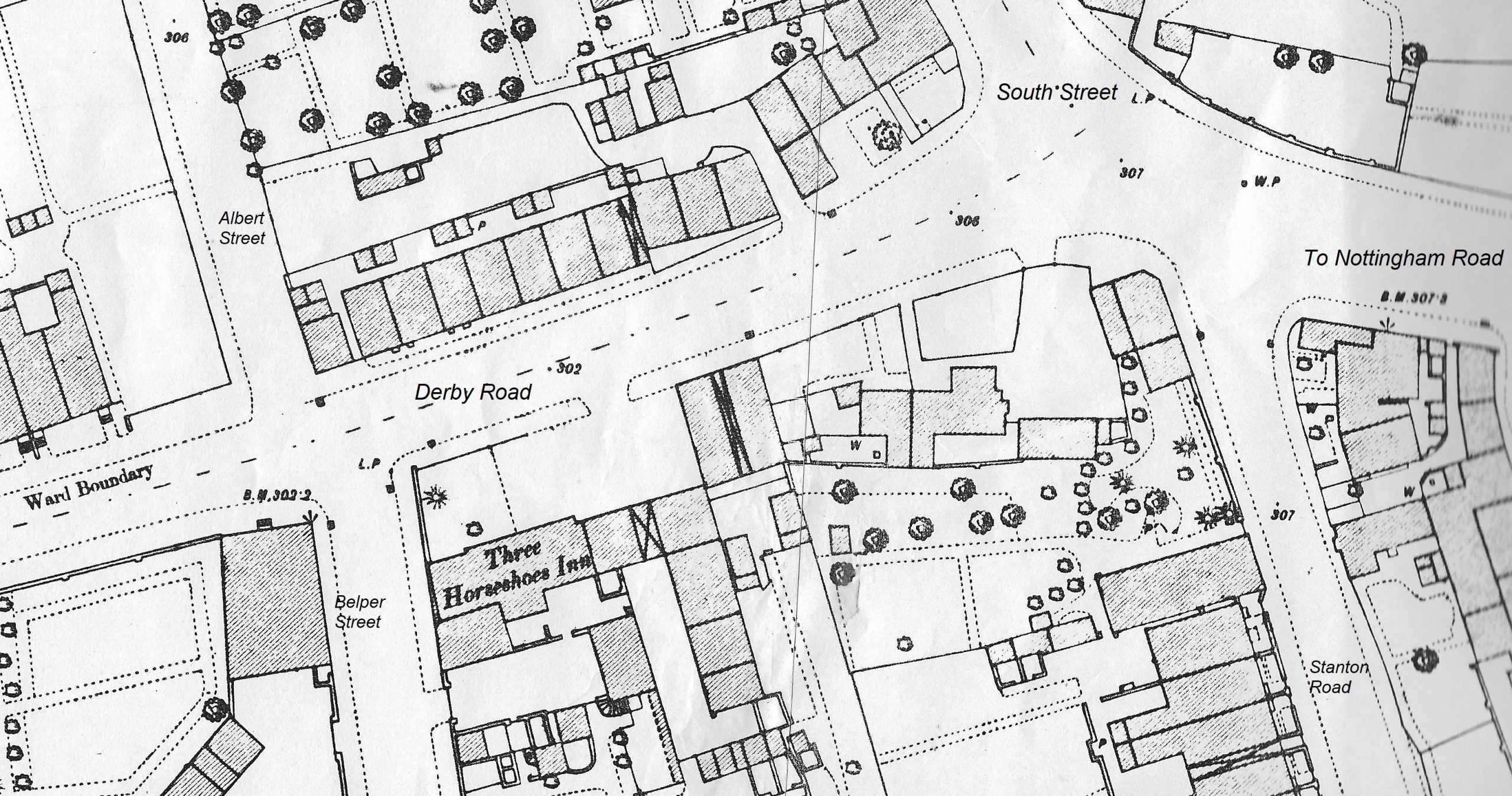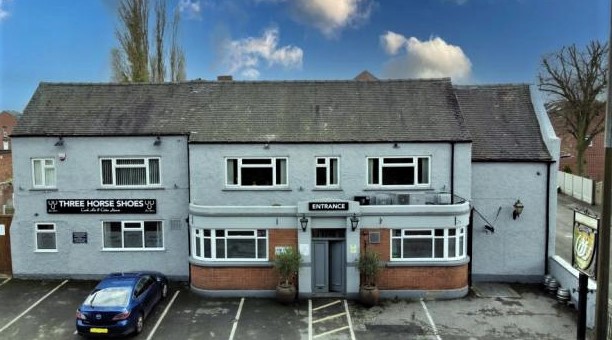Adeline now takes us “up Derby Road, (just past Belper Street), where we come to Harvey’s public house, a rather quaint countrified place.” This was the Three Horse Shoes Inn
The Three Horse Shoes was an old Ilkeston Inn. It is mentioned by that name in Cresswell’s Nottingham Journal, January 1st 1774, when an auction of premises belonging to Mr Cripps and his sister Mrs. Cripps is described. The landlord at that time was Henry Sills (mentioned on the preceeding page).
The Inn is also mentioned in Glover’s Directory of 1829, as ‘Horse and Shoe‘ when John Rolliston is the victualler. In Pigot &c. Directory of the same year, it appears again as the ‘Horse and Shoe‘, with William Rolliston as landlord. John had died in September 1829 and had been succeeded by his father William.
Just over a year later, on November 2nd, 1830, William married his son’s widow (his daughter-in-law). At that time landlord William was a widower — he was also “driver of the West Hallam Phenomenon Coach“. On July 16th, 1831 he was returning the coach to West Hallam, from Nottingham, when it overturned at Gallows Inn. William broke his thigh while sevewral passengers were badly injured and “Mr. Holland of Ilkeston was so much hurt that there was little hope of his recovery !
And in the Pigot Directory of 1835 William Rowliston is the landlord of the Three Horse Shoes.
And there is William Rowliston, aged 57, on the 1841 Census at Moors Bridge Lane, as a victualler, with 30-year old blacksmith Henry Sills, grandson of the above-mentioned Henry Sills, as his neighbour.
And the same landlord is there ten years later, on the 1851 census, but only one month widowed, and with the same neighbour.
In March 1852 Mrs. Mary Ann Hill, aged about 40 was housekeeper to William Rollinson (or Rowleston) at the Three Horse Shoes Inn in Derby Road — or Moors Bridge Lane as it was then called. She left this establishment ostensibly to go to her mother’s funeral near Basford but not before taking with her William’s silver watch, a quantity of silver spoons, a silver sugar bowl, a metal teapot, one bell, several items of clothing, sheets, table cloths, a banker”s draft for £70 and notes and coins not belonging to her.
Old William was infirmed and lame, had lost his wife Mary just over a year before, and had employed Mary Ann to be his housekeeper while a man called Robert Mathers was his ostler and brewer. This man left at the same time as the housekeeper.
Constable George Small was quickly on the case of the ‘disappearing duo’. After making enquiries, he hired a horse and gig, drove to Derby railway station, took the 2.15am train to Liverpool, arrived there at 7am, and within hours had apprehended the thief with her accomplice at a lodging house. They were just about to sail for America but now instead had to make a return trip to Ilkeston and a date at Derby Assizes.
At their trial in July, where they were both found guilty, the judge commented that they had wanted to travel abroad and he would not disappoint them — they were each sentenced to ten years’ transportation.
Some time between 1852 and 1855 wheelwright William Severn became the landlord at the Three Horse Shoes.
John Harvey, landlord until 1884
John Harvey was the son of Mapperley shoemaker John and Jane (nee Cresswell) and he married Mary Tomlinson on January 23rd, 1860, she being the daughter of Shipley farmer William and Ann (nee Gamble) and the niece of farmer Henry Tomlinson of South Street.
John became proprietor of the Three Horse Shoes at about this time.
Just over a year after their marriage and shortly after the birth of their first child Mary, John was charged by his wife with violently beating her, an offence which brought him before the magistrates. He was fined 1s with 10s expenses, and was bound over to keep the peace for twelve months. This assault does not appear to have had an outwardly permanent effect upon their relationship. The couple continued together at the Three Horse Shoes for over 20 years and had at least another six children there.
The Inn’s proximity to Ilkeston’s Irish ‘quarter’ may have provided it with customers but could also cause problems.
In May 1874 brickyard labourer Martin Scully – who argued that he was only three parts inebriated and not totally drunk – tried to kick down the front door of the Three Horse Shoes. Landlord John sent for P.C. Arms who tried to take the Irishman to the lock-up at the Town Hall, but the latter was not going to go either quietly or willingly. He was helped in his resistance by a large crowd of mainly Irish onlookers which had quickly assembled and tried to ‘rescue’ Martin from the clutches of the law. The mêlée moved towards the toll-bar where the labourer was wrested free and transported in triumph to his nearby home. His reprieve was only temporary.
Two weeks later, at the Petty Sessions — and being as it was his first offence — Martin was fined only 5s and 10s 6d costs.
John Harvey died on October 8th, 1884, aged 55, after an unfortunate visit to Nottingham Goose Fair.
He was with his son John junior on Thursday, October 2nd, crossing Clumber Street in Nottingham, when he was obliged to move aside to avoid a horse, only to be knocked down and run-over by a four-wheeled cab driven by Henry Clarke– and kicked by its horse for good measure. Wounded at the back of his head he was taken to the city’s General Hospital for treatment and returned home that evening.
Three days later John fell into a coma and despite an operation on his skull to extract congealed blood oppressing his brain he never regained consciousness and died the following day.
The inn then continued to be held by John’s wife Mary, who didn’t get off to the best of starts. In October 1885 she was accused by Captain Sandys, inspector of weights and measures, of selling adulterated whiskey on July 23rd. She was adding too much water to the spirit — water which the customers hadn’t asked for !! She was found guilty and fined, but could find some consolation (perhaps) in the fact that she was not the only one — Emily Hofton of the Peacock Inn, John Brooks of the Hand and Heart, John Barker of the Bridge Inn, and Sarah Turton of the Nag’s Head, were also caught on that same date.
The year 1893 came and Mary was now aged 65, still working on the family farm at Little Hallam as well as acting as landlady of the Three Horse Shoes, though she was not in good health. She had not been well since that autumn but was determined to work on.
On Friday, February 17th, she felt particularly poorly. She had her tea in the afternoon and them set about preparing a meal for the rest of the family. Suddenly exclaiming “Oh, my God !”, Mary staggered backwards, was about to fall into the fire but was caught by her daughter Constance. She died immediately “with painful suddenness .. heart disease the suspected cause”.
After Mary’s death the inn’s licence passed to her eldest son John junior. The care of the inn was then taken on by their children, into the next century.
Martin Harvey has kindly added family detail to this:
John Harvey, the landlord of the Three Horse Shoes, who died as a result of injuries sustained when being hit by a horse and carriage in Nottingham, was my great grandfather. His son William was my grandad.
William became landlord of the Three Horse Shoes. He also, I believe, had Little Hallam farm. He met his second wife, my grandma, when she was a barmaid at the pub. She was 20 odd years his Junior. They had 7 children together and moved to Doncaster to live in the mid 1920s.
Martin mentions John’s son, William Harvey, and it was on November 7th, 1891, that he came to the ‘rescue‘ of his mother. She was still a tenant on her Little Hallam farm which was owned by the Duke of Rutland, when a couple of workmen turned up to do a bit of ‘tree-pruning and felling‘ for the Duke. They were George Bramley junior and Alan Walker Blount — both coalminers and Church Street residents, so I suspect they were doing some ‘part-time’ work ? By tradition and law, the top wood was the property of the farm tenant, but the two labourers tried to take it away with them. William wasn’t having this and upset their cart, containing the wood, and from there, of course the argument seemed to spiral out of control — an assault was alleged, with pieces of the wood being used as weapons. In their defence the woodcutters claimed that they had been told to leave enough topwood so that the tenants could repair their fences, but the rest was to be taken away. This wasn’t persuasive enough and both men were fined 20s with 12s 3d costs.
John Harvey junior was landlord on April 30th 1895 and had, hanging in his tap-room, a map with a list of advertisers on it. Into the inn came Harry Roberts, a partner in a firm of Nottingham map-dealers, and his new employee, Arthur Richards who was being shown how to canvass for advertisers. They sat close by the map while they had their refreshments and then left … and it was then that John noticed the wall no longer had a map hanging on it !!
He quickly went into White Lion Square, accompanied by P.C. Lenton, and spotted the two. While they were being questioned by the officer Harry fainted — twice !! — and seemed most distraught; he had to be revived with a tonic hastily supplied by a nearby chemist. Back at the inn, Harry was further revived by a glass of brandy and then it was discovered that he had several maps on his person, including the one which had adorned John’s wall a short time previously … but now with its wooden rollers cut off. His claim was that he had taken it down from the wall to copy its list of advertisers, meaning to replace it with a brand new one as soon as he had published it; his companion Arthur was an innocent by-standers, silently reading his newsaper and totally oblivious to what Harry was doing.
The map-dealer was profusely apologetic and admitted that his behaviour reflected pure thoughtlessness; he had not the slightest felonious intent. But his offer to belatedly pay for the map was refused by the landlord — he didn’t want people coming into his inn and helping themselves to his property !! And thus the pair of visitors found themselves at the Petty Sessions nearly a week later. Arthur was quickly put out his misery, the case against him dismissed. Harry, however, had to ‘grovel at the feet’ of the magistrates, called a few character witnesses, and offered to make generous reparations. It worked !! The Bench allowed the case to be withdrawn on payment of 23s, and a payment of three guineas to Ilkeston Hospital.
And here is the Inn in later life …
The photo is taken from Derby Road, with Belper Street just visible to the right. Across that street would have been the Miner’s Arms (now a private residence). Little Hallam lies behind the Three Horse Shoes, in the distance.
————————————————————————————————————————————–
And we are almost at the end of the road.



